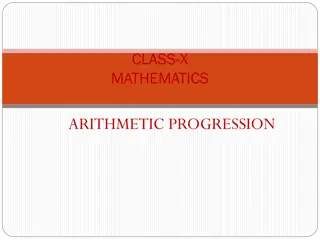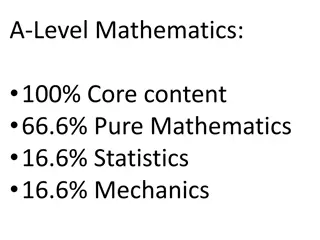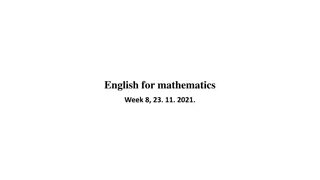Understanding Diagonalization in Mathematics
Diagonalization plays a crucial role in converting complex problems into simpler ones by allowing matrices to be represented in a diagonal form. The process involves finding eigenvalues and corresponding eigenvectors, ultimately leading to a diagonal matrix representation. However, careful consideration is needed to determine if a matrix is diagonalizable, as a defective matrix may not be suitable for this transformation.
Download Presentation

Please find below an Image/Link to download the presentation.
The content on the website is provided AS IS for your information and personal use only. It may not be sold, licensed, or shared on other websites without obtaining consent from the author. Download presentation by click this link. If you encounter any issues during the download, it is possible that the publisher has removed the file from their server.
E N D
Presentation Transcript
Diagonalization Revisted Isabel K. Darcy Mathematics Department Applied Math and Computational Sciences University of Iowa Fig from knotplot.com
A is diagonalizable if there exists an invertible matrix P such that P 1AP = D where D is a diagonal matrix. Diagonalization has many important applications It allows one to convert a more complicated problem into a simpler problem. Example: Calculating Ak when A is diagonalizable.
3 3
3 3 3 3 3
More diagonalization background: I.e., we are assuming A is diagonalizable since implies
Check answer:
To diagonalize a matrix A: Step 1: Find eigenvalues: Solve the equation: det (A ) = 0 for Step 2: For each eigenvalue, find its corresponding eigenvectors by solving the homogeneous system of equations: (A )x = 0 for x. Case 3a.) IF the geometric multiplicity is LESS then the algebraic multiplicity for at least ONE eigenvalue of A, then A is NOT diagonalizable. (Cannot find square matrix P). Matrix defective = NOT diagonalizable.
Case 3b.) A is diagonalizable if and only if geometric multiplicity = algebraic multiplicity for ALL the eigenvalues of A. Use the eigenvalues of A to construct the diagonal matrix D Use the basis of the corresponding eigenspaces for the corresponding columns of P. (NOTE: P is a SQUARE matrix). NOTE: ORDER MATTERS.
For more complicated example, see video 4: Eigenvalue/Eigenvector Example & video 5: Diagonalization Step 1: Find eigenvalues: Solve the equation: det (A I) = 0 for
characteristic equation: = -3 : algebraic multiplicity = geometric multiplicity = dimension of eigenspace = = 5 : algebraic multiplicity geometric multiplicity dimension of eigenspace 1 geometric multiplicity algebraic multiplicity
characteristic equation: = -3 : algebraic multiplicity = 1 geometric multiplicity = 1 dimension of eigenspace = 1 Matrix is not defective. = 5 : algebraic multiplicity = 1 geometric multiplicity = 1 dimension of eigenspace = 1 1 geometric multiplicity algebraic multiplicity
characteristic equation: = -3 : algebraic multiplicity = 1 geometric multiplicity = 1 dimension of eigenspace = 1 Matrix is not defective. Thus A is diagonalizable = 5 : algebraic multiplicity = 1 geometric multiplicity = 1 dimension of eigenspace = 1 1 geometric multiplicity algebraic multiplicity
characteristic equation: = -3 : algebraic multiplicity = 1 geometric multiplicity = 1 dimension of eigenspace = 1 Matrix is not defective. Thus A is diagonalizable = 5 : algebraic multiplicity = 1 geometric multiplicity = 1 dimension of eigenspace = 1 1 geometric multiplicity algebraic multiplicity
Find eigenvectors to create P Nul(A + 3 ) = eigenspace corresponding to eigenvalue = -3 of A
Find eigenvectors to create P Nul(A - 5 ) = eigenspace corresponding to eigenvalue = 5 of A Basis for eigenspace corresponding to = 5:
Basis for eigenspace corresponding to = -3: Basis for eigenspace corresponding to = 5:
Basis for eigenspace corresponding to = -3: Basis for eigenspace corresponding to = 5:
Note we want to be invertible. Note P is invertible if and only if the columns of P are linearly independent. We get this for FREE!!!!!
Note there are many correct answers. Diagonalize
Note there are many correct answers. Diagonalize ORDER MATTERS!!!























